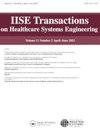Routing and staffing in emergency departments: A multiclass queueing model with workload dependent service times
IF 1.5
Q3 HEALTH CARE SCIENCES & SERVICES
IISE Transactions on Healthcare Systems Engineering
Pub Date : 2022-07-14
DOI:10.1080/24725579.2022.2100522
引用次数: 1
Abstract
Abstract Efficient patient flow through an emergency department is a critical factor that contributes to a hospital’s performance, which influences overall patient health outcomes. In this work, we model a multiclass multiserver queueing system where patients of varying acuity receive care from one of several wards, each ward is attended by several nurses who work as a team. Supported by empirical evidence that a patient’s time-in-ward is a function of the nurse-patient ratio in that ward, we incorporate state-dependent service times into our model. Our objective is to reduce patient time in system and to control nurse workload by jointly optimizing patient routing and nurse allocation decisions. Due to the computational challenges in formulating and solving the queueing model representation, we study a corresponding deterministic fluid model which serves as a first-order approximation of the multiclass queueing model. Next, we formulate and solve an optimization model using the first-order control equations and input the results into a discrete-event simulation to estimate performance measures, such as patient length-of-stay and ward workload. Finally, we present a case study using retrospective data from a real hospital which highlights the importance of accounting for nurse workload and service behavior in developing routing and staffing policies.急诊部门的路由和人员配置:具有工作负载依赖服务时间的多类别排队模型
通过急诊科的高效患者流程是影响医院绩效的关键因素,影响患者的整体健康结果。在这项工作中,我们模拟了一个多级别多服务器排队系统,不同视力的患者从几个病房中的一个接受护理,每个病房由几个护士组成一个团队。在经验证据的支持下,病人的住院时间是病房护士-病人比例的函数,我们将依赖于状态的服务时间纳入我们的模型。我们的目标是通过共同优化患者路线和护士分配决策来减少患者在系统中的时间和控制护士工作量。由于排队模型的表述和求解在计算上的困难,我们研究了一个相应的确定性流体模型,作为多类别排队模型的一阶近似。接下来,我们使用一阶控制方程制定并求解优化模型,并将结果输入到离散事件模拟中,以估计性能指标,如患者住院时间和病房工作量。最后,我们提出了一个案例研究,使用来自一家真实医院的回顾性数据,强调了在制定路线和人员配备政策时,考虑护士工作量和服务行为的重要性。
本文章由计算机程序翻译,如有差异,请以英文原文为准。
求助全文
约1分钟内获得全文
求助全文
来源期刊

IISE Transactions on Healthcare Systems Engineering
Social Sciences-Safety Research
CiteScore
3.10
自引率
0.00%
发文量
19
期刊介绍:
IISE Transactions on Healthcare Systems Engineering aims to foster the healthcare systems community by publishing high quality papers that have a strong methodological focus and direct applicability to healthcare systems. Published quarterly, the journal supports research that explores: · Healthcare Operations Management · Medical Decision Making · Socio-Technical Systems Analysis related to healthcare · Quality Engineering · Healthcare Informatics · Healthcare Policy We are looking forward to accepting submissions that document the development and use of industrial and systems engineering tools and techniques including: · Healthcare operations research · Healthcare statistics · Healthcare information systems · Healthcare work measurement · Human factors/ergonomics applied to healthcare systems Research that explores the integration of these tools and techniques with those from other engineering and medical disciplines are also featured. We encourage the submission of clinical notes, or practice notes, to show the impact of contributions that will be published. We also encourage authors to collect an impact statement from their clinical partners to show the impact of research in the clinical practices.
 求助内容:
求助内容: 应助结果提醒方式:
应助结果提醒方式:


